Photostat copy of diaries of Benjamin Bennett Leane, 1915-1916 - Part 18
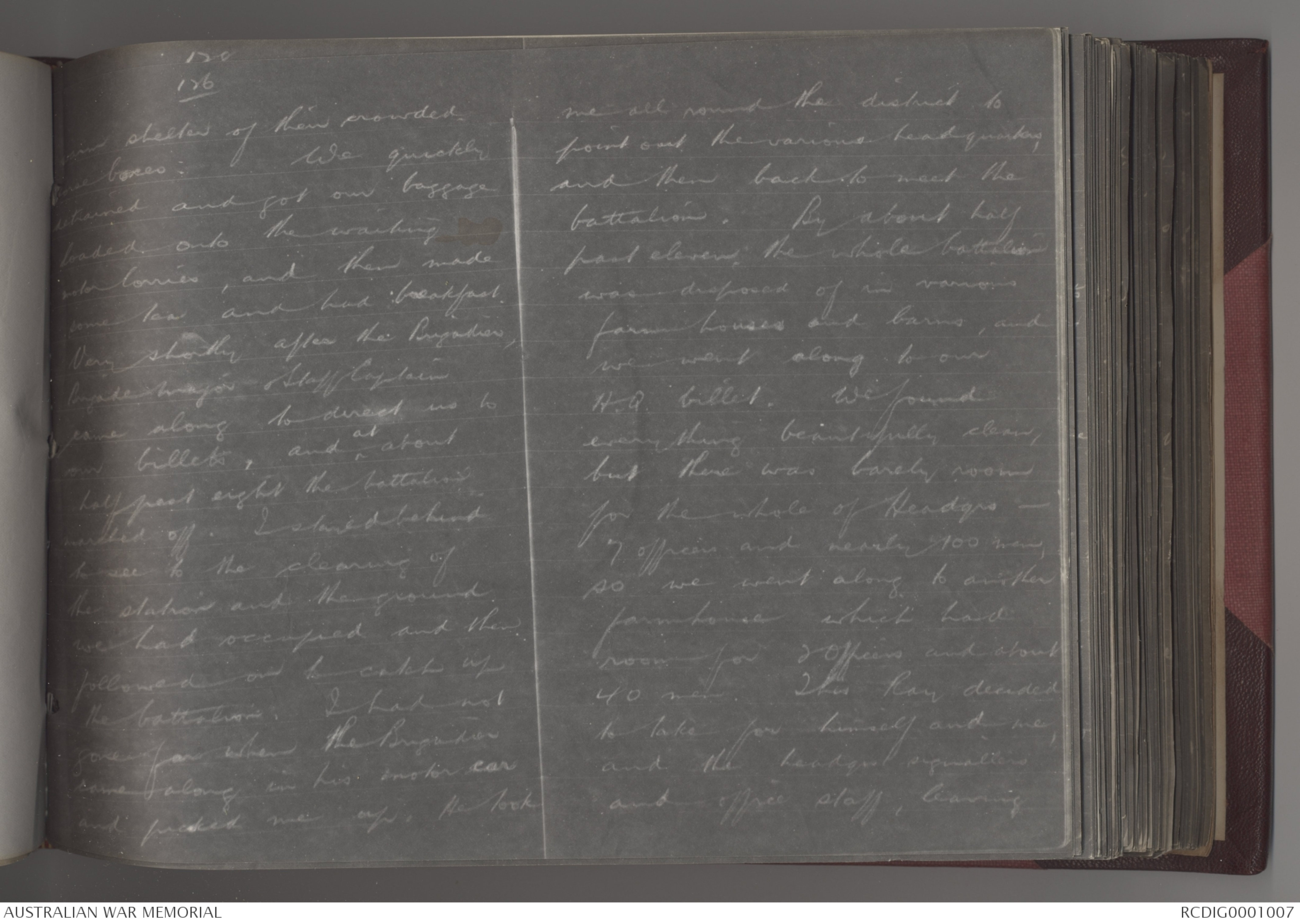
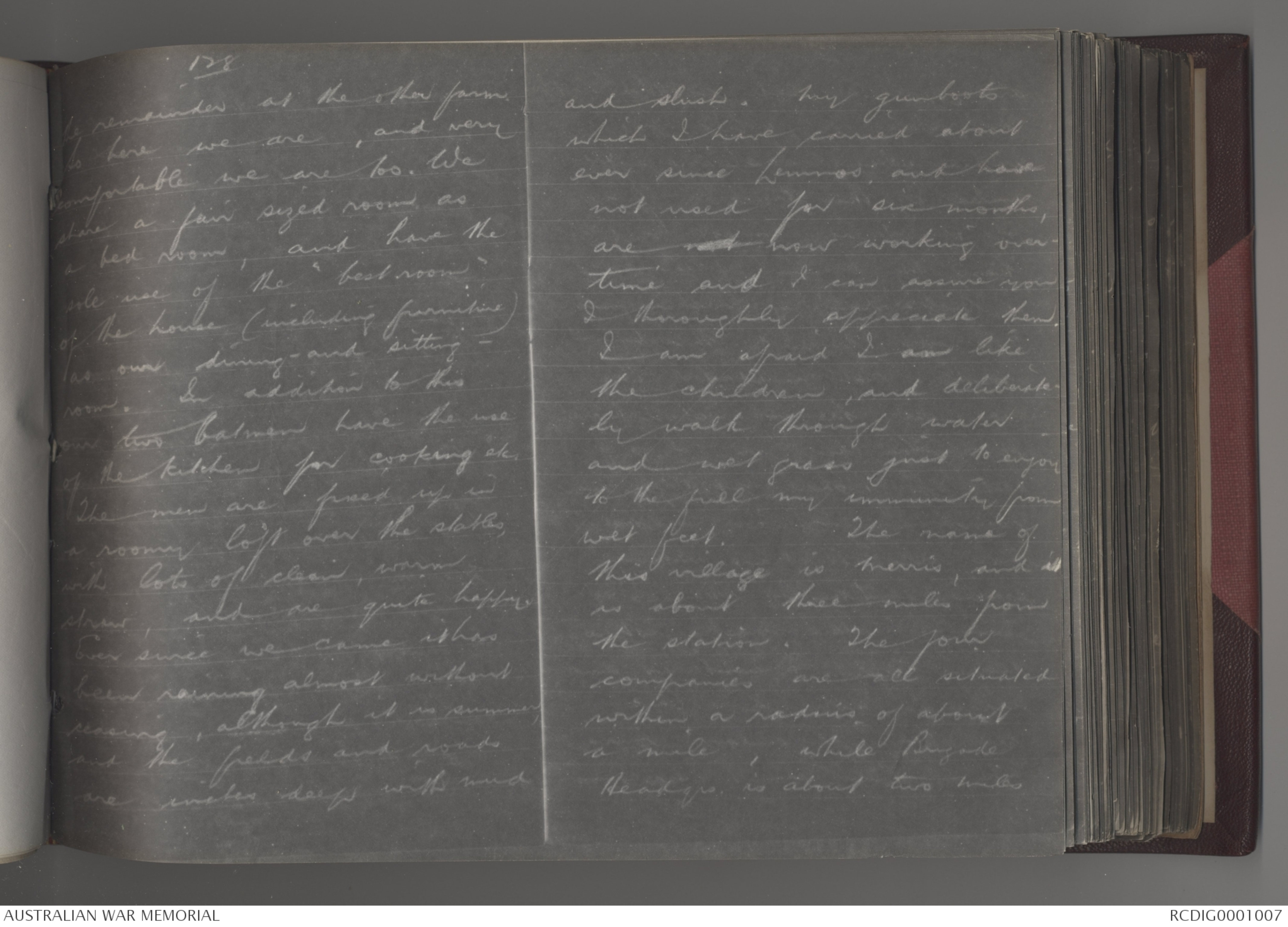
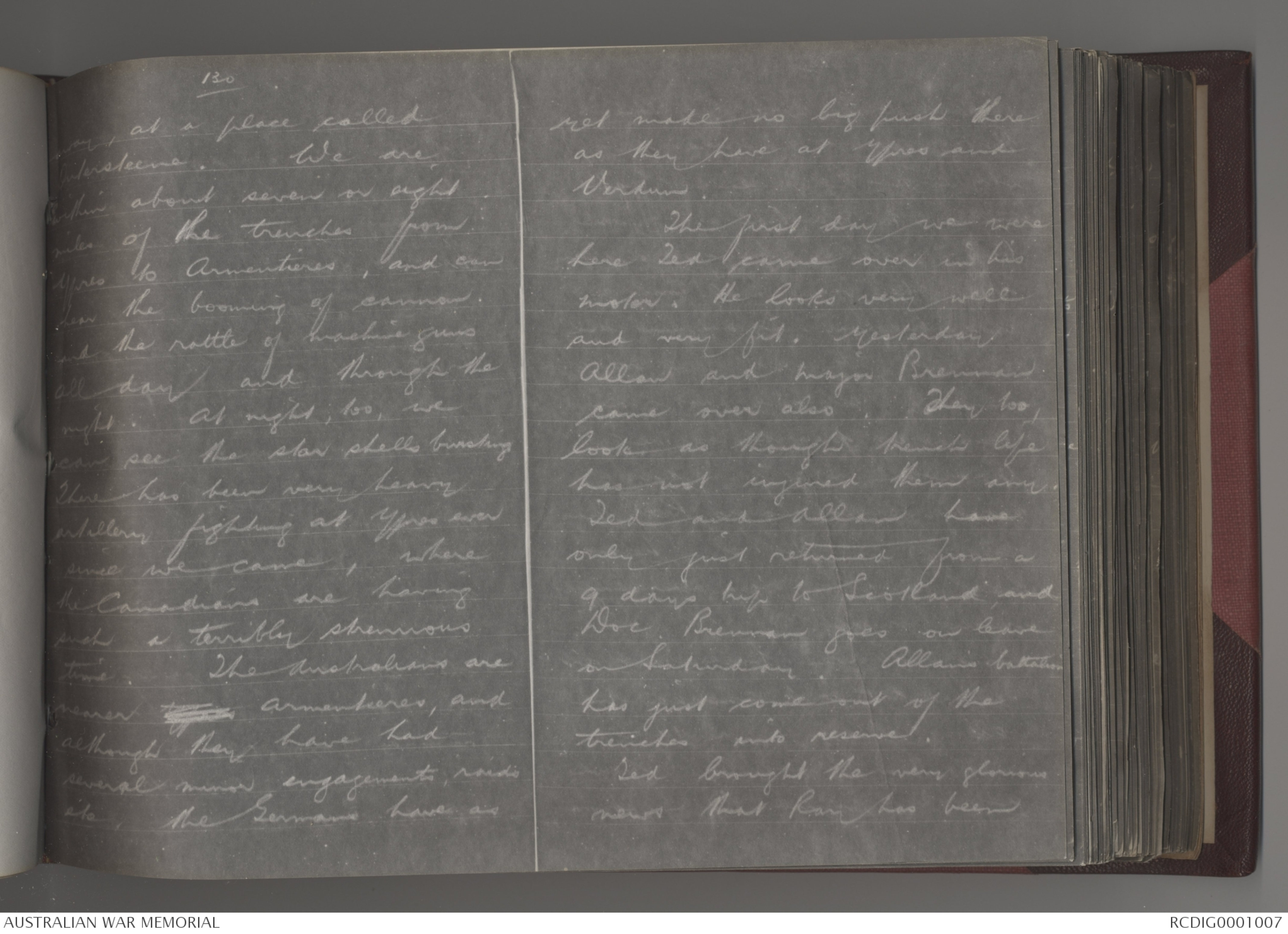
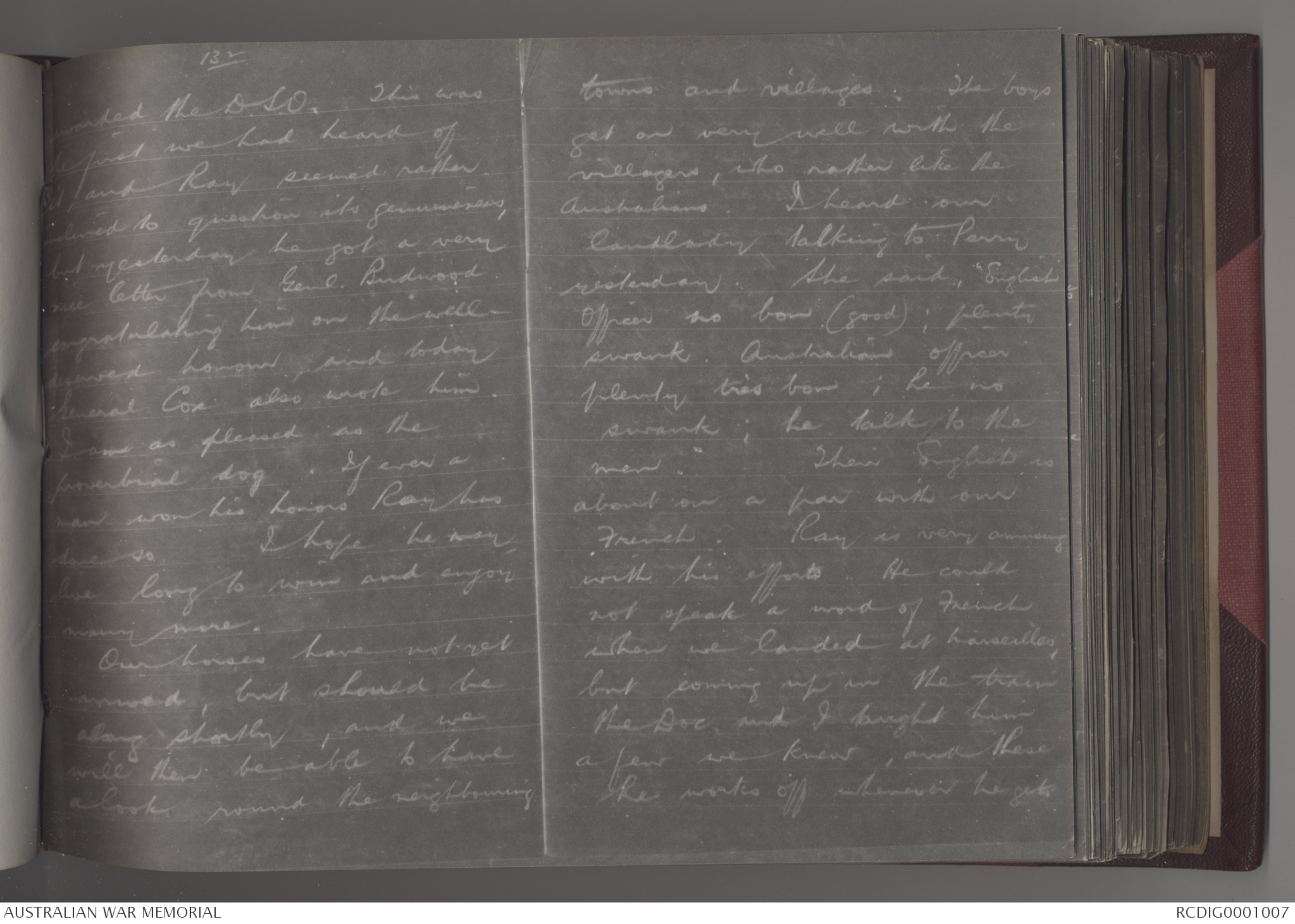
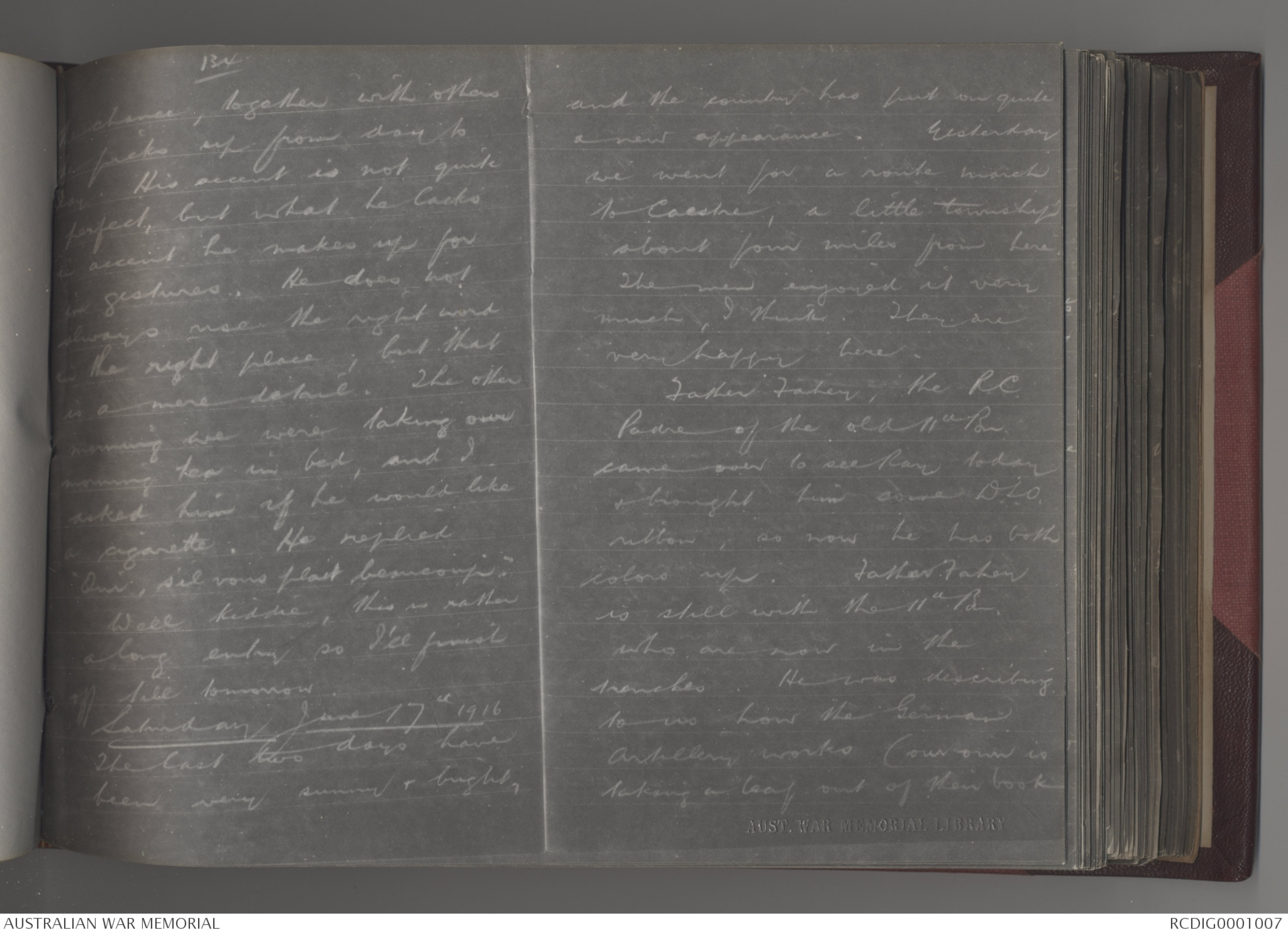
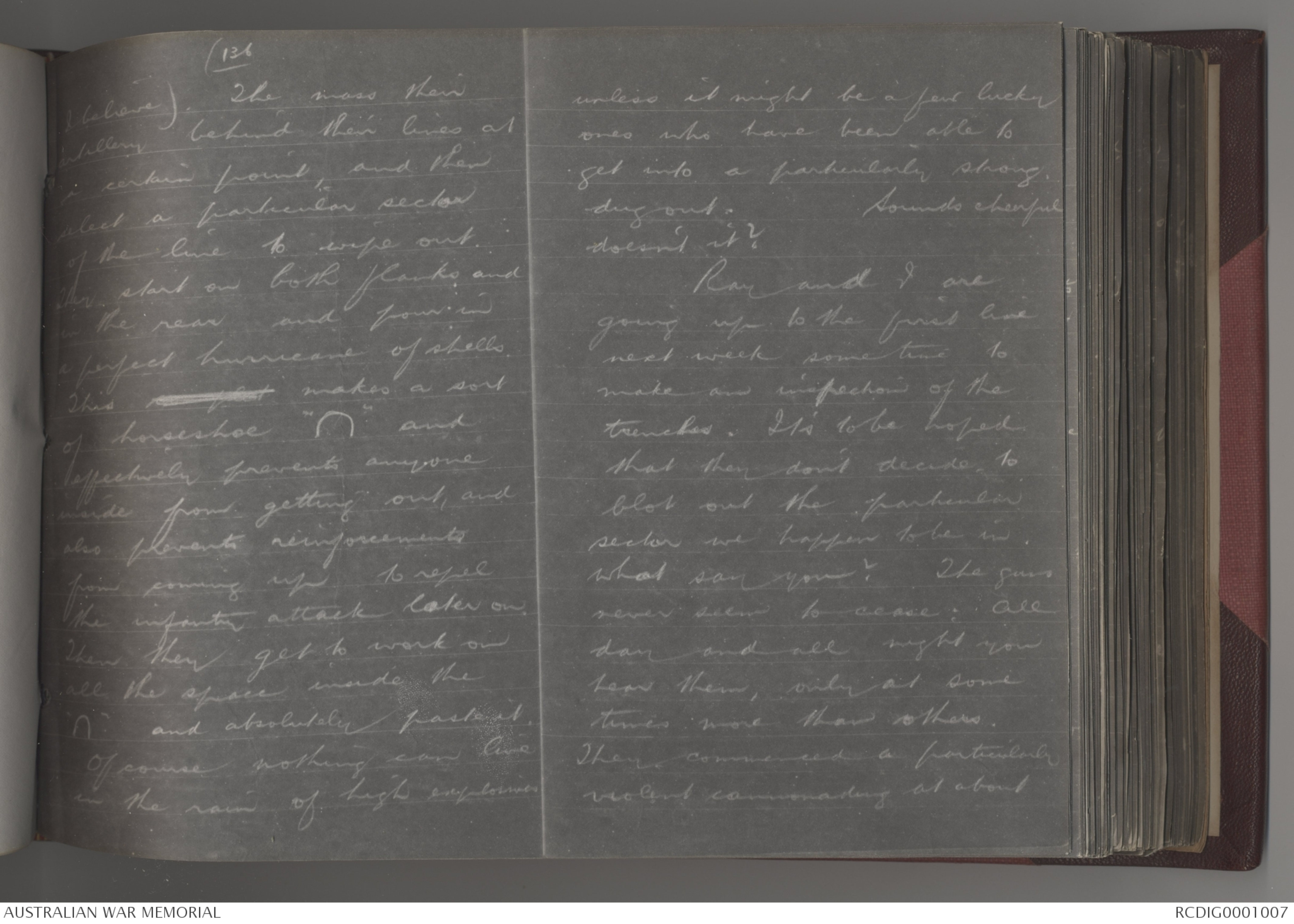
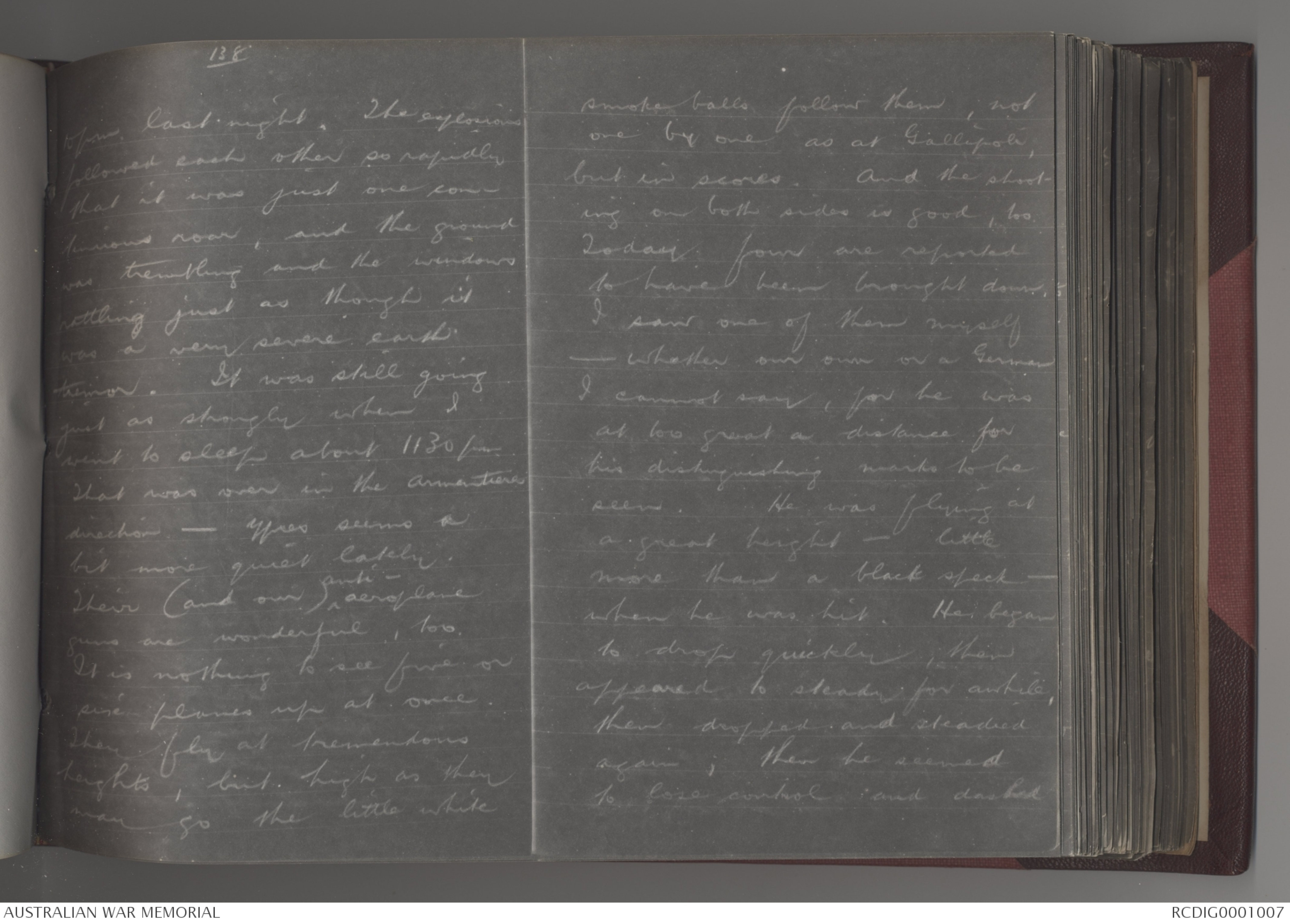
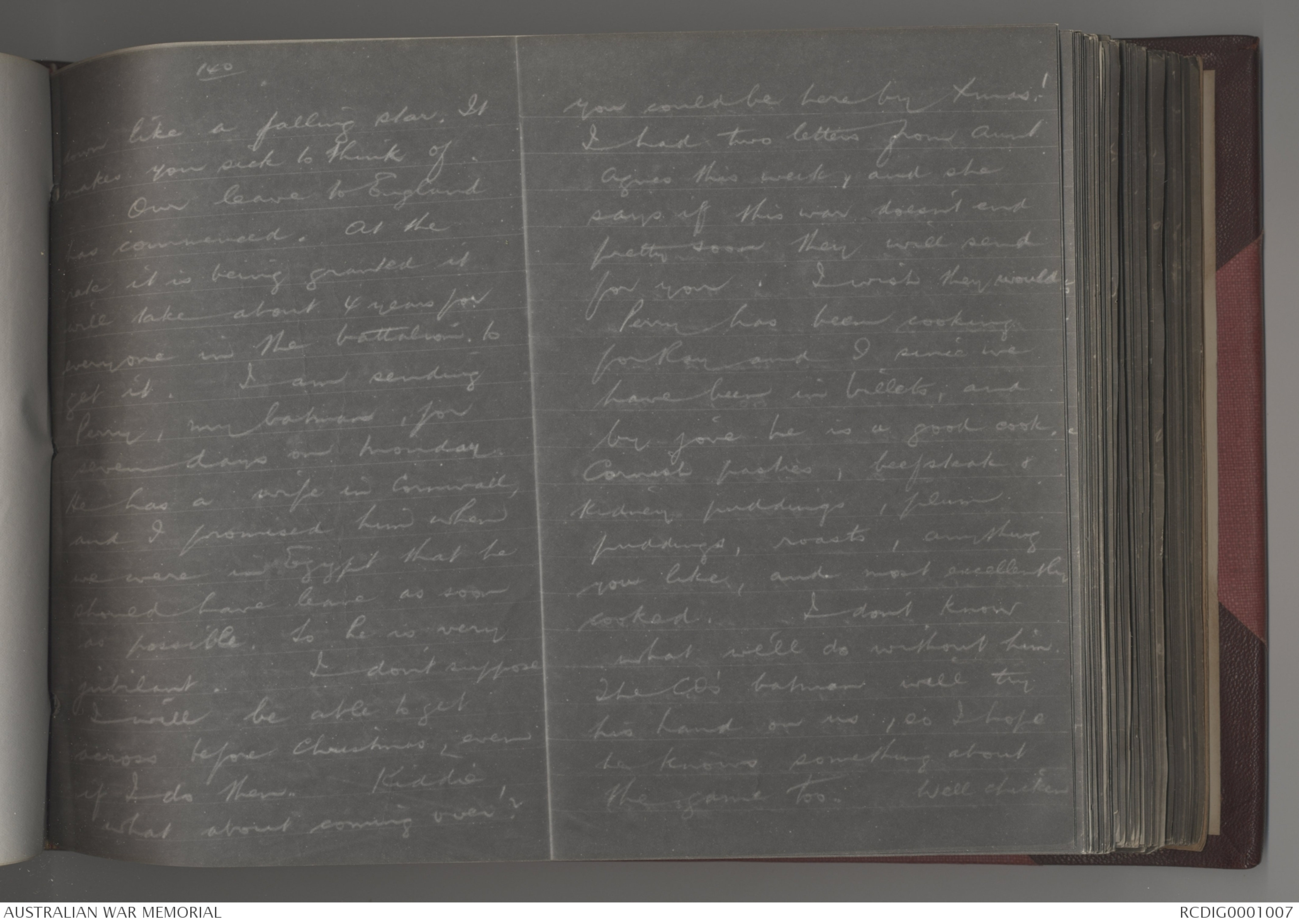
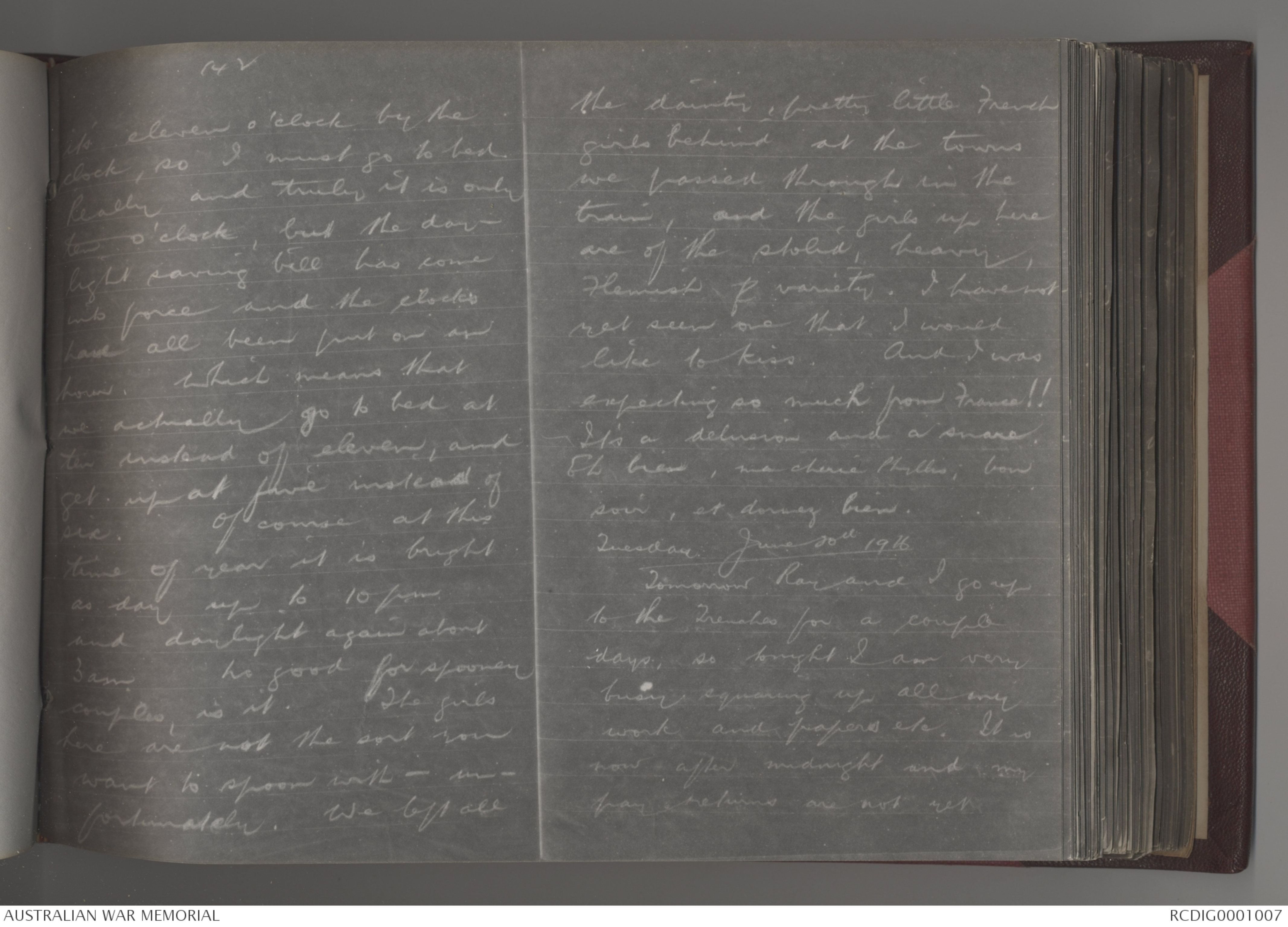
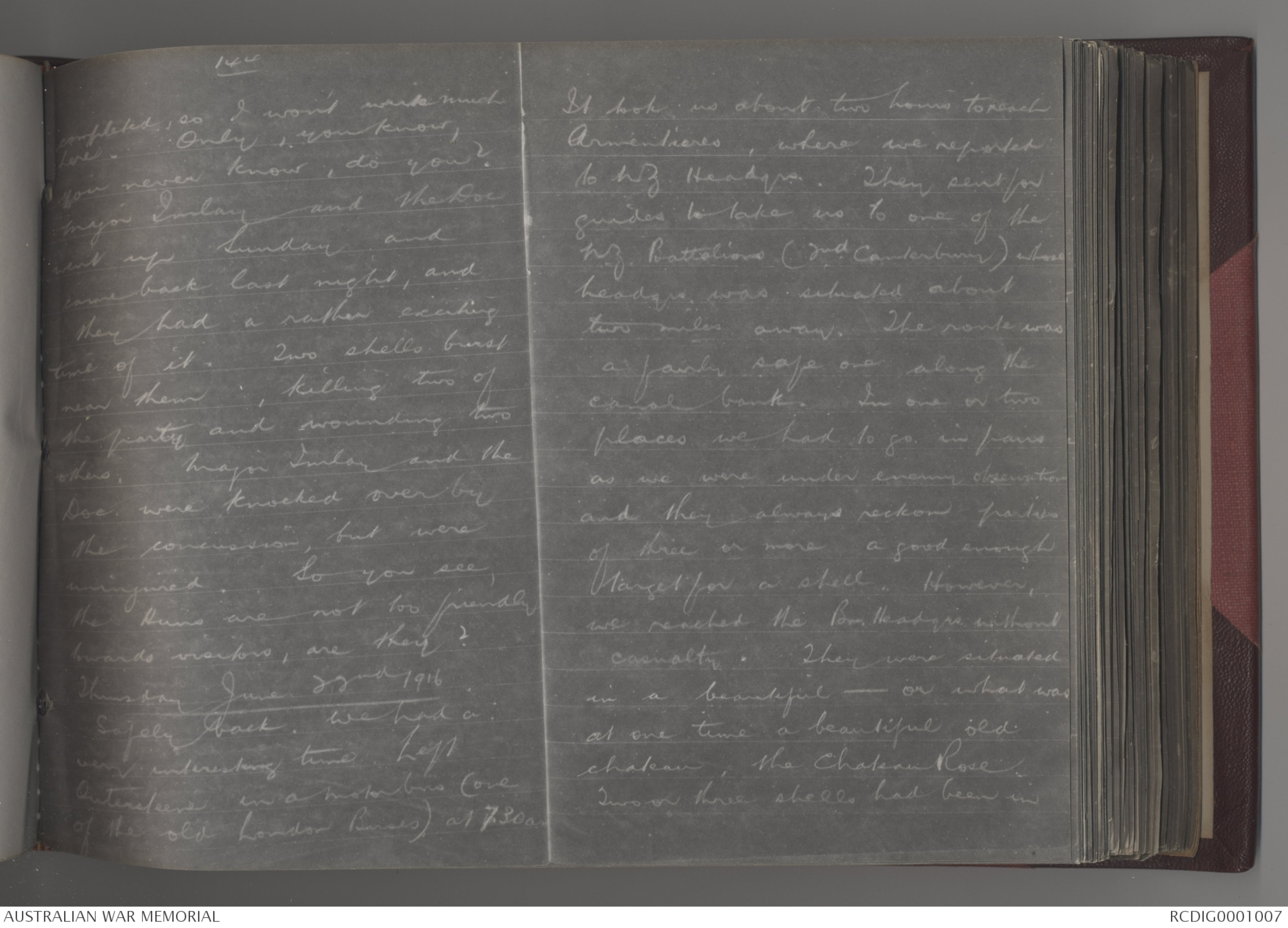
120
126
in shelter of their crowded
horse boxes. We quickly
entrained and got our baggage
loaded onto the waiting
motor lorries, and then made
some tea and had breakfast.
Very shortly after the Brigadier,
Brigade Major & Staff Captain
came along to direct us to
our billets, and ^at about
half past eight the battalion
marched off. I stayed behind
to see to the clearing of
the station and the ground
we had occupied and then
followed on to catch up
the battalion. I had not
gone far when the Brigadier
came along in his motor car
and picked me up. He took
me all round the district to
point out the various headquarters
and then back to meet the
battalion. By about half
past eleven, the whole battalion
was disposed of in various
farm houses and barns, and
we went along to our
H.Q. billet. We found
everything beautifully clean,
but there was barely room
for the whole of Headqrs-
7 officers and nearly 100 men,
so we went along to another
farmhouse which had
room for 2 officers and about
40 men. This Ray decided
to take for himself and me,
and the headqrs signallers
and office staff, leaving
128
the remainder at the other farm.
So here we are, and very
comfortable we are too. We
share a fair sized room as
a bed room, and have the
sole use of the "best room"
of the house (including furniture)
as our dining - and sitting -
room. In addition to this
our two batmen have the use
of the kitchen for cooking etc.
The men are fixed up in
a roomy loft over the stables,
with lots of clean, warm
straw, and are quite happy.
Ever since we came it has
been raining almost without
ceasing, although it is summer
and the fields and roads
are inches deep with mud
and slush. My gumboots
which I have carried about
ever since Lemnos, and have
not used for six months,
are not now working overtime
and I can assure you
I thoroughly appreciate them.
I am afraid I am like
the children and deliberately
walk through water
and wet grass just to enjoy
to the full my immunity from
wet feet. The name of
this village is Merris, and it
is about three miles from
the station. The four
companies are all situated
within a radius of about
a mile, while Brigade
Headqrs is about two miles
130
away, at a place called
Outersteene. We are
within about seven or eight
miles of the trenches from
Ypres to Armentieres, and can
hear the booming of cannon
and the rattle of machine guns
all day and through the
night. At night, too, we
can see the star shells bursting.
There has been very heavy
artillery fighting at Ypres ever
since we came, where
the Canadians are having
such a terribly strenuous
time. The Australians are
nearer Ypres Armentieres, and
although they have had
several minor engagements, raids
etc., the Germans have as
yet made no big push there
as they have at Ypres and
Verdun.
The first day we were
here Ted came over in his
motor. He looks very well
and very fit. Yesterday
Allan and Major Brennan
came over also. They too,
look as though trench life
has not injured them any.
Ted and Allan have
only just returned from a
9 days trip to Scotland and
Doc. Brennan goes on leave
on Saturday. Allan's battalion
has just come out of the
trenches into reserve.
Ted brought the very glorious
news that Ray has been
132
awarded the D.S.O. This was
the first we had heard of
it and Ray seemed rather
inclined to question its genuineness,
but yesterday he got a very
nice letter from Genl. Birdwood
congratulating him on the well-deserved
honour, and today
General Cox also wrote him.
I am as pleased as the
proverbial dog. If ever a
man won his honors Ray has
done so. I hope he may
live long to win and enjoy
many more.
Our horses have not yet
arrived, but should be
along shortly, and we
will then be able to have
a look round the neighbouring
towns and villages. The boys
get on very well with the
villagers, who rather like the
Australians. I heard our
landlady talking to Perry
yesterday. She said, "English
Officer no bon (good); plenty
swank. Australian officer
plenty très bon; he no
swank; he talk to the
men." Their English is
about on a par with our
French. Ray is very amusing
with his efforts. He could
not speak a word of French
when we landed at Marseilles,
but coming up in the train
the Doc and I taught him a
few we knew, and these
he works off whenever he gets
134
a chance, together with other
he picks up from day to
day. His accent is not quite
perfect, but what he lacks
in accent he makes up for
in gestures. He does not
always use the right word
in the right place; but that
is a mere detail. The other
morning we were taking our
morning tea in bed, and I
asked him if he would like
a cigarette. He replied
"Oui, s'il vous plait beaucoup."
Well Kiddie, this is rather
a long entry so I'll finish
off till tomorrow.
Saturday June 17th 1916
The last two days have
been very sunny & bright,
and the country has put on quite
a new appearance. Yesterday
we went for a route march
to Caestre, a little township
about four miles from here.
The men enjoyed it very
much, I think. They are
very happy here.
Father Fahey, the R.C.
Padre of the old 11th Bn
came over to see Ray today
& brought him some D.S.O
ribbon, so now he has both
colors up. Father Fahey
is still with the 11th Bn,
who are now in the
trenches. He was describing
to us how the German
Artillery works (our own is
taking a leaf out of their book
( 136
I believe). The mass their
artillery behind their lines at
a certain point, and then
select a particular sector
of the line to wipe out.
They start on both flanks and
in the rear and pour in
a perfect hurricane of shells.
This xxxxxxx makes a sort
of horseshoe "∩" and
effectively prevents anyone
inside from getting out, and
also prevents reinforcements
from coming up to repel
the infantry attack later on.
Then they get to work on
all the space inside the
"∩" and absolutely paste it.
Of course nothing can live
in the rain of high explosives
unless it might be a few lucky
ones who have been able to
get into a particularly strong
dugout. Sounds cheerful
doesn't it?
Ray and I are
going up to the first line
next week sometime to
make an inspection of the
trenches. It's to be hoped
that they don't decide to
blot out the particular
sector we happen to be in.
What say you? The guns
never seem to cease; All
day and all night you
hear them, only at some
times more than others.
They commenced a particularly
violent cannonading at about
138
10pm last night. The explosions
followed each other so rapidly
that it was just one continuous
roar, and the ground
was trembling and the windows
rattling just as though it
was a very severe earth
tremor. It was still going
just as strongly when I
went to sleep about 11.30pm.
That was over in the Armentieres
direction - Ypres seems a
bit more quiet lately.
Their (and our) ^anti-aeroplane
guns are wonderful, too.
It is nothing to see five or
six planes up at once.
They fly at tremendous
heights, but high as they
may go the little white
smoke balls follow them, not
one by one as at Gallipoli,
but in scores. And the shooting
on both sides is good, too.
Today, four are reported
to have been brought down.
I saw one of them myself
__ whether our own or a German
I cannot say, for he was
at too great a distance for
his distinguishing marks to be
seen. He was flying at
a great height - little
more than a black speck-
when he was hit. He began
to drop quickly, then
appeared to steady for awhile,
then dropped and steadied
again, then he seemed
to lose control and dashed
140
down like a falling star. It
makes you sick to think of.
Our leave to England
has commenced. At the
rate it is being granted it
will take about 4 years for
everyone in the battalion to
get it. I am sending
Perry, my batman, for
seven days on Monday.
He has a wife in Cornwall,
and I promised him when
we were in Egypt that he
should have leave as soon
as possible. So he is very
jubilant. I don't suppose
I will be able to get
across before Christmas, even
if I do then. Kiddie,
what about coming over?
you could be here by Xmas !
I had two letters from Aunt
Agnes this week, and she
says if this war doesn't end
pretty soon they will send
for you. I wish they would.
Perry has been cooking
for Ray and I since we
have been in billets, and
by jove he is a good cook.
Cornish pasties, beefsteak &
kidney puddings, plum
puddings, roasts, anything
you like, and most excellently
cooked. I don't know
what we'll do without him.
The C.O's batman will try
his hand on us, so I hope
he knows something about
the game too. Well chicken
142
its eleven o'clock by the
clock, so I must go to bed.
Really and truly it is only
ten o'clock, but the daylight
saving bill has come
into force and the clocks
have all been put on an
hour. Which means that
we actually go to bed at
ten instead of eleven, and
get up at five instead of
six. Of course, at this
time of year it is bright
as day up to 10pm
and daylight again about
3am. No good for spooney
couples, is it. The girls
here are not the sort you
want to spoon with - unfortunately.
We left all
the dainty, pretty little French
girls behind at the towns
we passed through in the
train, and the girls up here
are of the stolid, heavy,
Flemish f variety. I have not
yet seen one that I would
like to kiss. And I was
expecting so much from France!!
It's a delusion and a snare.
Eh bien, ma cherie Phyllis, bon
soir, et dormez bien.
Tuesday June 20th 1916
Tomorrow Ray and I go up
to the Trenches for a couple
days, so tonight I am very
busy squaring up all my
work and papers etc. It is
now after midnight and my
pay returns are not yet
144
completed, so I won't write much
here. Only, you know,
you never know, do you?
Major Imlay and the Doc
went up Sunday and were
back last night, and
they had a rather exciting
time of it. Two shells burst
near them, killing two of
the party and wounding two
others. Major Imlay and the
Doc were knocked over by
the concussion, but were
uninjured. So you see,
the Huns are not too friendly
towards visitors, are they?
Thursday June 22nd 1916
Safely back. We had a
very interesting time. Left
Outersteene in a motor bus (one
of the old London buses) at 7.30am.
It took about two hours to reach
Armentieres, where we reported
to N.Z. Headqrs. They sent for
guides to take us to one of the
NZ. Battalions (2nd Canterbury) whose
headqrs was situated about
two miles away. The route was
a fairly safe one along the
canal bank. In one or two
places we had to go in pairs
as we were under enemy observation
and they always reckon parties
of three or more a good enough
target for a shell. However,
we reached the Bn Headqrs without
casualty. They were situated
in a beautiful - or what was
at one time a beautiful old
chateau, the Chateau Rose.
Two or three shells had been in
 Loretta Corbett
Loretta CorbettThis transcription item is now locked to you for editing. To release the lock either Save your changes or Cancel.
This lock will be automatically released after 60 minutes of inactivity.